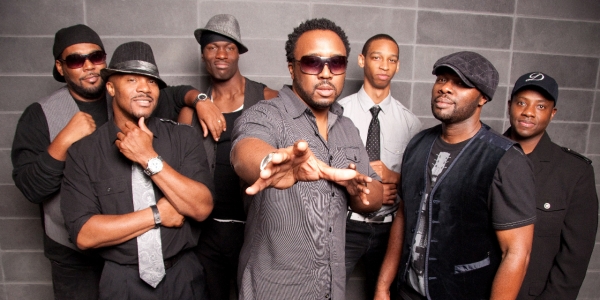I first heard about them when a friend from Sydney emailed me saying she’d been to Buble and I had to check out the support act. Unusual. Unusual they are. Seven guys on stage imitating instruments and one sound guy somehow keeping track of who’s singing vocals, impersonating a bass or being a vocal drumkit.
It’s hard to explain, so thanks to the wonders of the internet I offer you this link. Once you’ve taken that in this is also required viewing. Roger Thomas and Rod Eldridge have been at meetings all day and have a show later on when I meet up with them, but they’re relaxed, and apparently have a little recording session planned in their hotel room before they head off to the show.
It’s a schedule they’ve grown used to over the eleven years the group has been togethrer. “We’re on the road 250 days a year,” says Thomas. “Put it this way, we’ve not met anybody that says that they tour more than us. We’ve just got – ever since we went full time in 2001, we have really never had a time where we really need to get more dates. It’s just been there, people have always been booking us.”
Just keeping a band together for eleven years is a feat, let alone touring for most of the year. Thomas says, “We’ve learned that having the same vision, really really helps. Seeing the same thing and taking time to meet and go okay, now that we’re here, this is what we want to do next and this is where we want to go. And doing that same thing about management, that’s the best advice I can give to anyone ‘cause once you’re not on the same page? Ouch.” Eldrige adds, “For us, eleven years together – some of us been singing together longer than that. Success has been how a snowball grows – steady, slow progression. Some groups can’t take it – they disband along the way. Those, like us, who have been able to stand these times, it just strengthens the core. You’ve experienced so many things and you’ve also seen a lot of mistakes that have been made and you’ll learn from them. So I think, once you’ve gotten to this point, it seems like, if we hold out as long as we don’t fall apart from touring so much – we could probably do this until almost forever, because we’ve figured it out, and figured one another out and the system and how to work together.”
Most of the group are married and many have kids. Thomas says he thinks his wife would be ok with the group touring into their fifties. “I think she would be very very cool with that. The five of us that are married, the key to that is really – in my case, I’ll speak in my case – is her really loving what we do. I don’t think it can work without you loving what your husband does. For him to be away that much, and of course just really being very strong and understanding, that type of thing. It almost, in our case, has almost worked in the positive sense because we miss each other to an extent. It’s always very, very fresh when I’m back at home. The same thing with the children. It’s, you know, Daddy’s the King when he comes home. You’ve gotta have that understanding, that love for it.”
Whilst Thomas is the most prolific songwriter in the group all of the members have a hand in writing songs, often in groups of two or three, which are then brought to the group and worked on. A song only makes it onto the album if it’s in one of the group members’ top three. Writing for an acapella group which impersonates instruments is a unique experience. “There’s two schools of thought, and we’ve now entered the second phase of the second school of thought,” says Thomas. “The first school of thought is if we’re a band and we want to imitate instruments, we should start with real instruments, and then imitate those instruments. So, oftentimes we’ll put together a track, a piece, an arrangement where you can hear – this is what we’re going to imitate – with live instruments, or programmed instruments. We did that for many many years and we’ll probably still do that, but there’s a second school of thought which is that the voice is very versatile and it’s also able to do things that instruments cannot do.
“So you also can have hybrids of sounds that a person will say ‘oh, that’s very flute-like, and at the same time it sounds like a voice, or it sounds like something I’ve never heard before.’ So we’ve been experimenting with all sorts of different things like that where we start from – ‘this is the arrangement we need, I think a flute should sing this part, and I think this part right here should be distorted – who’s the best guy for that?”
The group can also jam in acapella. “We were jamming just the other day,” says Thomas. “In fact, I recorded it because I was just like ‘yeah, that’s a good jam’ – that’s another school of thought. We didn’t do that very often in terms of looking to record like we might be able to use it. We might jam from time to time but it was just for the moment, but as we became friends with Coldplay, I was talking with Chris Martin one time and sometimes they would just go into the studio and they were just going to jam and find something. And not till you listen back you’ll find ‘oh there’s a section right there that’s really good’ and it’s not going to come from any other form, people being around each other and feeding into each other. So that’s started happening more often.”
Eldridge explains that the best jams are sometimes unplanned, “Someone, whether it be drums or someone else – just starts a lick of some sort and before you know it – sometimes to the chagrin of our sound man, because oftentimes these jams happen during sound check when we’re supposed to be getting other things done – something breaks out and you get a full on jam based on some lick that one guy does.” Listening to the sound, it’s easy to imagine that the sound desk and effects play a signficant part. In fact, while there’s a lot more juggling of levels, the effects are pretty similar to a standard band.
Thomas explains the effects set-up. “It’s not as big as some people would think, but because I think of all the stuff going on up there, our sound man has his hands full for sure. We are going from – Rod can be singing a lead thing, and then the next minute he’s in a background booth, then the next minute he’ll be doing DJ-type stuff, and then he’s doing the guitar.
“Our rule has been ‘whatever an acoustic instrument would use’ so if you’ve got an acoustic guitar and you want to make it an electric guitar it has to go through some distortion, with reverbs and chorus things or whatever – we’ll put our voices through the exact same sort of thing. We’ve got to then make the movements, we’ve got to travel and do the things that a guitar would do – but now that person hears that sound that they’re familiar with – it usually comes from an electric guitar coming from us.
“So we’ll have a guitar rack, that a band would have – someone would say ‘why would a vocal group have a guitar rack’ because we ‘become a guitar’ and the same thing, if we become an organ, we find out what is the effect that makes that happen with the organ, so circular effect when you hear that voice going round and round – a human being really can’t just make his voice go round and round like that, so some of those things are done from the sound man – he’ll have a couple of those effect units. I don’t know how many he’s got at this point but he’d probably have like two road cases of effects. And one sound guy, which most people find pretty amazing because he’s gotta be like an octopus there but he gets it done.”







